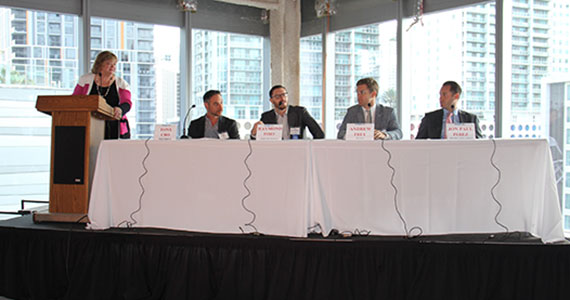Miami’s urban core markets generated $1.2 billion in retail property sales last year, with more than half of the total occurring in Brickell, downtown and Wynwood, according to a recent commercial real estate report prepared for the Commercial Industrial Association of South Florida.
The findings were made public Friday during a panel discussion sponsored by the association that featured Tony Cho of Metro 1, Raymond Fort of Arquitectonica, Andrew Frey of Tecela, and Jon Paul Perez of the Related Group.
On the leasing side, the Biscayne Boulevard corridor, Brickell, downtown Miami, the Design District, Midtown, MiMo, Little River and Wynwood accounted for a combined 10 million square feet of leased space. Vacancy rates range from as low as less than 2 percent in Brickell to 12 percent in the Design District.
Miami’s urban centers will continue to experience rapid growth in the commercial retail sector in 2016 as the market for luxury condo sales slows down, the panelists told audience members huddled inside an unfinished office suite at Three Brickell City Centre.
“There is going to be a slowdown and a correction in ultra high luxury,” Metro 1 founder and CEO Cho said. “I think we will see a shift in type of projects [getting built]. I see more infill, mixed use projects catering to millennials.”
Frey, Tecela’s principal, echoed Cho. “With waterfront luxury high-rise condos, there is going to be an oversupply and there is going to be a decline in value,” Frey said. “I don’t think that is any real surprise to anyone. That is separate from the rest of the real estate industry, including multifamily, retail and office. I think [those sectors] seem to be doing pretty well.”
The panelists specifically singled out the ongoing transformation of Wynwood, which has morphed from an artist-driven warehouse community into a thriving, hip retail and office neighborhood over the last decade. With the new zoning overlay that was approved for Wynwood last year by the city commission, the neighborhood is poised for even more growth once developers in the area complete new residential buildings.
“I most recently fell in love with Wynwood,” said Perez, a Related vice president. “I didn’t understand it until about a year ago. You get this real sense of a new neighborhood that is truly transforming and changing.”
Frey said the new zoning overlay is good because Wynwood developers can now build projects with more density. “You will have actual residents, locals and repeat customers that live in the neighborhood,” he said. “With the new rezoning, you have opened a fantastic development opportunity there.”
According to the association’s market report, Wynwood experienced $165 million in retail property sales volume in 2015 and the vacancy rate is right at 6 percent. The average lease price for retail space is just above $80 per square foot.
